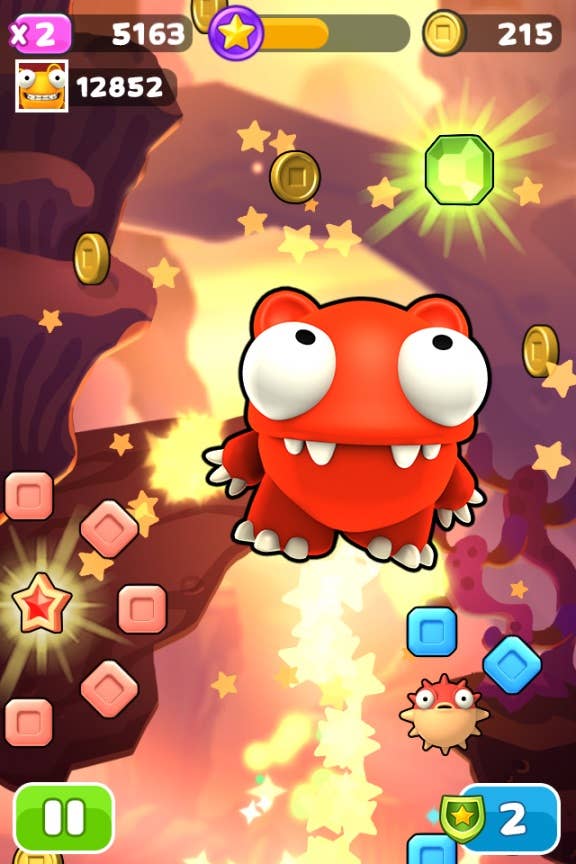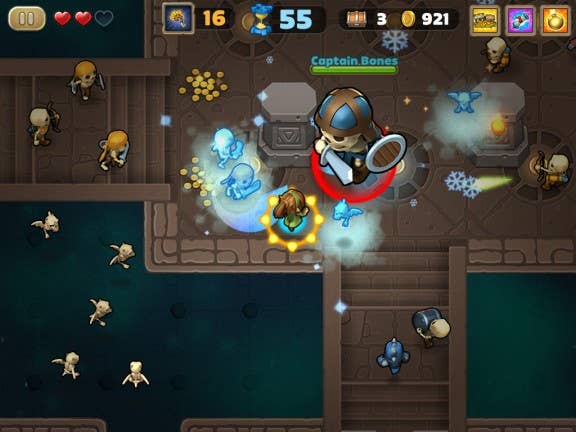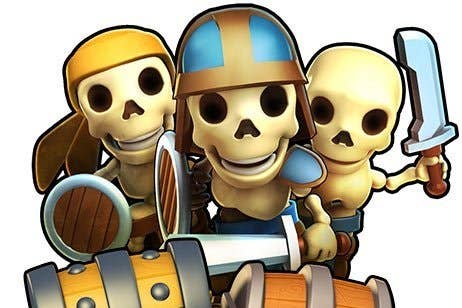The price of premium
Get Set Games' latest switched gears from casual free-to-play to core premium. So how did it go?
Conventional wisdom in the mobile gaming industry right now states that free-to-play is the dominant business model. It's an approach that has paid off for numerous developers, not least of which is Toronto-based Get Set Games. Since 2010, Get Set has made a name for itself with casual free-to-play titles like App Store chart-toppers Mega Jump 2 and Mega Run. But for its latest release, last month's Storm Casters, company co-founder Derek van Vliet told GamesIndustry.biz there were two reasons the company took the premium route and slapped a $1.99 admission price on the game (bolstered by some in-app purchase options).
For one thing, van Vliet said the studio was under time constraints, and premium games can take less time to create.
"It's easier to make a premium game if you don't have to put in all the freemium hooks, social hooks, and all sorts of different monetization schemes that freemium games have," van Vliet said. "If you saw the amount of things we cut as a result of going premium... If you think there are freemium hooks in there now, it would have been double or triple what you see."
"I think premium apps tend to make [Apple's] devices look better than some free apps do... And I think in general, Apple likes to promote things that make their devices look good."
Additionally, Get Set thought the premium approach might give Storm Casters a bit of a promotional edge on the App Store.
"We've noticed over the last six to nine months, Apple seems to be pretty consistently featuring paid apps on the App Store," van Vliet said. "It seemed like there was this trend going on where they'd feature a paid game and a free game or a paid app and a free app every week. And we kind of took that as a hint that Apple wanted to bolster the premium market a little bit, and we hoped we could leverage that."
Apple gets a cut of all App Store revenue regardless of its source, but van Vliet speculated that the company would have an interest in promoting paid apps because they line up better with Apple's ideal consumer experience.
"I think premium apps tend to make their devices look better than some free apps do," he said. "Premium apps just tend to have less cruft, they don't have ads popping up in your face or anything else getting in the way of what is usually a quality experience. And I think in general, Apple likes to promote things that make their devices look good."

As for the reception of the game, it's been a bit mixed.
"From what we've seen so far, everybody who buys the game loves it," van Vliet said. "It seems like we've had very few unhappy customers. Scale is definitely a concern. We're finding it's just very hard to get this game into people's hands because, I assume, the price point... It was basically clear pretty quickly that the game was not going to make its money back as a premium game."
As a result, Get Set Games has had to trim headcount, cutting what had been an 11-person studio down to a team of six. The studio also is looking into releasing a free-to-play version of Storm Casters.
"It's kind of concerning to me as a player because I really like premium games," van Vliet said. "I tend to buy them whenever I see a good one. I was pretty excited to see Monument Valley by ustwo. That gave us a lot of hope as far as premium games on the App Store go. I loved it as a player and then of course, it gives me hope as somebody who makes games."
"Right now we have Kim Kardashian at the top of the App Store, and that's kind of hard to compete against when you're just six guys making casual games."
While the studio isn't swearing off paid apps in the future, van Vliet said it would be entirely dependent on how much the app in question cost to develop.
The price tag wasn't the only risk Get Set Games took with Storm Casters. The title, a top-down action title inspired by arcade-style shooters like Smash TV, was decidedly less casual than anything the company had previously released. And even though Storm Casters hasn't performed to expectations, van Vliet isn't seeing that as an indictment of the game's viability in the market.
"I really hope and I do think there's a place for mid-core and hardcore gaming on mobile," van Vliet said. "The evidence we've seen for that is that Storm Casters, more than any of our games, has sparked conversation. We've seen threads pop up in various game forums that are an order of magnitude larger than any of our previous games... That gives me a lot of hope for midcore and hardcore gaming. So the next question for us is, 'Is there a way to harness that, encourage it and leverage that to make future games more profitable than this one?'"
Obviously that isn't the only challenge ahead of Get Set. There's also the question of how they--and countless other small independent mobile developers--can continue to compete for eyeballs against increasingly well-funded competition, often backed by key brands. It's a challenge van Vliet said has only gotten more daunting with time.

"We've seen with each title in the last 18-24 months, it just keeps getting harder and harder," he said of competing with branded titles. "And that has everything to do with bigger players coming in with expert user acquisition teams, and some of them are big brands that have weight associated with them. Right now we have Kim Kardashian at the top of the App Store, and that's kind of hard to compete against when you're just six guys making casual games."
Get Set has some experience on the other side of this issue, having partnered with Disney on Monsters Inc. Run. Released in late 2012 (but since removed from the App Store), Monsters Inc. Run was very lucrative for the studio, according to van Vliet. And while he said it was terrific working with Disney on the project, it's not an experience Get Set is eager to repeat.
"It consumed our studio for the better part of a year, and in hindsight, that was just time we probably would have liked to have back," van Vliet said. "The time you have, the time you spend is so valuable. And if you can afford to spend more time in building your own brand, I'd say it's worth it."

